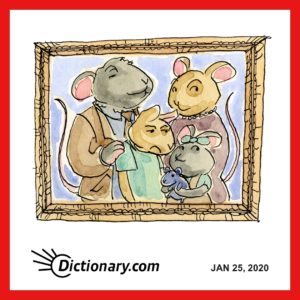Word of the Day
murine
adjective
belonging or pertaining to the rodent subfamily Murinae, which includes more than 500 species of mice and rats.
More about murine
Murine is an uncommon adjective pretty much restricted in zoology to mice and rats and the diseases they cause or transmit. Murine comes straight from the Latin adjective mūrīnus “of mice, mouse-colored,” a derivative of the noun mūs (inflectional stem mūr-). During the 4th century b.c., original intervocalic s in Latin became r; thus the Roman gens name Papīsius became Papīrius, and mūsīnus (if the word already existed) became mūrīnus. Mūs remains unchanged in the Latin derivative noun mūsculus “muscle.” Mūs is identical with the very common Proto-Indo-European noun mūs, which remains mūs also in Germanic (English mouse); mūs becomes mŷs in Greek, mū́ṣ– in Sanskrit, and mysz in Polish. Murine entered English in the early 17th century.

how is murine used?
His estimate of just over two million rats in the city would have been horrifying but for the long-held belief that New York housed equal numbers of rats and humans, as if a municipal sponsor program had assigned each of the eight million New Yorkers a muck-dwelling murine counterpart.
But in order to study how that activity affects human brains at the cellular level, researchers at the University of Oregon managed to put murine brains into a somewhat equivalent state.
hobnob
verb (used without object)
to associate on very friendly terms (usually followed by with): She often hobnobs with royalty.
More about hobnob
The verb hobnob, originally meaning “to drink together, toast one another in turn,” is a rhyming phrase (like willy-nilly). Hobnob is an alteration of hab nab, hab or nab “whether or not, haphazardly,” literally “(whether) I/you/he/she have or not have,” formed from habbe and nabbe, the present subjunctive of the Middle English verbs haven, habben and nabben (Old English habban, nabban) “to have, not to have.” Hobnob was used as a toast when clinking goblets. Willy-nilly comes from will I/you/he/she, nill I/you/he/she “(whether) I/you/he/she want to or not.” Hobnob in the sense “to drink together, toast one another” entered English in the second half of the 18th century; the sense “to associate on friendly terms” entered English in the first half of the 19th century.
how is hobnob used?
… they were to hobnob with nobility and hold friendly converse with kings and princes, grand moguls, and the anointed lords of mighty empires!
Didn’t I want to get out there, hobnob, curry favor, court support, mix it up, do battle, become a gladiator? I did not.
autodidact
noun
a person who has learned a subject without the benefit of a teacher or formal education; a self-taught person.
More about autodidact
Leonardo da Vinci was an autodidact; so were Abraham Lincoln and Thomas Edison. Autodidact ultimately comes from the Greek adjective autodídaktos “self-taught,” a clear compound of the combining form auto– “self, same” (as in autograph), from the Greek pronoun and adjective autós “self, same,” and the adjective didaktikós “good at teaching, instructive.” Autodidact entered English in the first half of the 16th century.
how is autodidact used?
He’s had a rich life as a blogger, and one of the ways he’s learned—he’s not shy about noting he’s an autodidact—has been through his many followers.